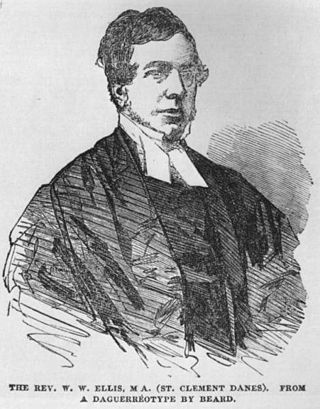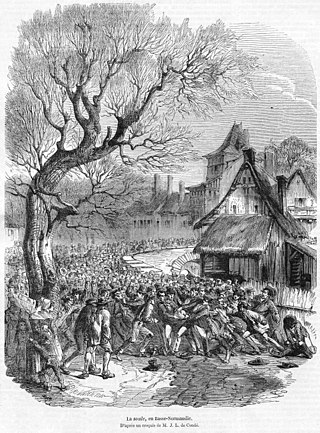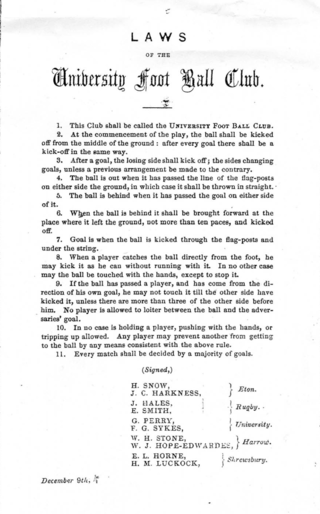Related Research Articles

Rugby football is the collective name for the team sports of rugby union or rugby league.

William Webb Ellis was an English Anglican clergyman who, by tradition, has been credited as the inventor of rugby football while a pupil at Rugby School. According to legend, Webb Ellis picked up the ball and ran with it during a school football match in 1823, thus creating the "rugby" style of play. Although the story has become firmly entrenched in the sport's folklore, it is not supported by first hand evidence, and is discounted by most rugby historians as an origin myth.
Matthew Holbeche Bloxam, a native of Rugby, Warwickshire, England, was a Warwickshire antiquary and amateur archeologist, author of a popular guide to Gothic architecture. He was the original source of the legend of William Webb Ellis' invention of the game of Rugby football.

In sport, a goal may refer to either an instance of scoring, or to the physical structure or area where an attacking team must send the ball or puck in order to score points. The structure of a goal varies from sport to sport, and one is placed at or near each end of the playing field for each team to defend. Sports which feature goal scoring are also commonly known as invasion games.

The history of rugby union follows from various football games long before the 19th century, but it was not until the middle of that century that the rules were formulated and codified. The code of football later known as rugby union can be traced to three events: the first set of written rules in 1845, the Blackheath Club's decision to leave the Football Association in 1863 and the formation of the Rugby Football Union in 1871. The code was originally known simply as "rugby football". It was not until a schism in 1895, over the payment of players, which resulted in the formation of the separate code of rugby league, that the name "rugby union" was used to differentiate the original rugby code. For most of its history, rugby was a strictly amateur football code, and the sport's administrators frequently imposed bans and restrictions on players who they viewed as professional. It was not until 1995 that rugby union was declared an "open" game, and thus professionalism was sanctioned by the code's governing body, World Rugby—then known as the International Rugby Football Board (IRFB).

Touch rugby refers to games derived from rugby football in which players do not tackle each other but instead touch their opponents using their hands on any part of the body, clothing, or the ball.

The Cambridge Rules were several formulations of the rules of football made at the University of Cambridge during the nineteenth century.

A rugby ball is an elongated ellipsoidal ball used in both codes of rugby football. Its measurements and weight are specified by World Rugby and the Rugby League International Federation, the governing bodies for both codes, rugby union and rugby league respectively.

Rugby union in Scotland is a popular team sport. Scotland's national side today competes in the annual Six Nations Championship and the Rugby World Cup. The first ever international rugby match was played on 27 March 1871, at Raeburn Place in Edinburgh, when Scotland defeated England in front of 4,000 people. Professional clubs compete in the United Rugby Championship, European Rugby Champions Cup and European Rugby Challenge Cup, while the Scottish League Championship exists for over 200 amateur and semi-professional clubs, as does a knock-out competition, the Scottish Cup. The governing body, the Scottish Rugby Union (SRU), is one of the ten first-tier member nations of World Rugby.
The following are events in the 1840s decade which are relevant to the development of association football. All events happened in English football unless specified otherwise.
The history of association football, more commonly known as football or soccer, stretches back at least to medieval times. Some predecessors of football may date back to ancient Greece and Rome, and similar games were played in ancient China and Japan. The history of football in Britain dates at least to the eighth century CE.
During the early modern era, pupils, former pupils and teachers at English public schools developed the rules of football, eventually leading to the first written codes of football most notably the Eton College (1815) and Aldenham school (1825) football rules, and rugby football (1845). British public schools football also directly influenced the rules of association football.
The sport of association football has a long history in England.

Rugby union in Scotland in its modern form has existed since the mid-19th century. Scotland has one of the oldest rugby union traditions and has introduced various innovations including rugby sevens.
1823 in sports describes the year's events in world sport.
1821 in sports describes the year's events in world sport.

Football is a family of team sports that involve, to varying degrees, kicking a ball to score a goal. Unqualified, the word football generally means the form of football that is the most popular where the word is used. Sports commonly called football include association football ; Australian rules football; Gaelic football; gridiron football ; International rules football; rugby league football; and rugby union football. These various forms of football share, to varying degrees, common origins and are known as "football codes".

Lelo or lelo burti, literally a "field ball [playing]", is a Georgian folk sport, which is a full contact ball game, and very similar to rugby. Within Georgian rugby union terminology, the word lelo is used to mean a try, and the popularity of rugby union in Georgia has also been attributed to it. In 2014, lelo burti, along with khridoli, a traditional martial art, was inscribed by the government of Georgia as a "nonmaterial monument" of culture.
1801 in sports describes the year's events in world sport.

A free kick is a method of restarting play in association football. It is awarded after an infringement of the laws by the opposing team.
References
- ↑ "Britain: Home of Football". FIFA. Archived from the original on 8 September 2015. Retrieved 1 September 2016.
- ↑ Sanders, pp. 27–30.
- 1 2 "Did William Webb Ellis invent Rugby?". The Rugby History Society. Retrieved 1 September 2016.
- ↑ Sanders, p. 10.
- ↑ Pilcher, Ross (11 April 2019). "Can Edinburgh lay claim to the world's oldest football club?". Edinburgh Live Sport. Retrieved 12 November 2021.